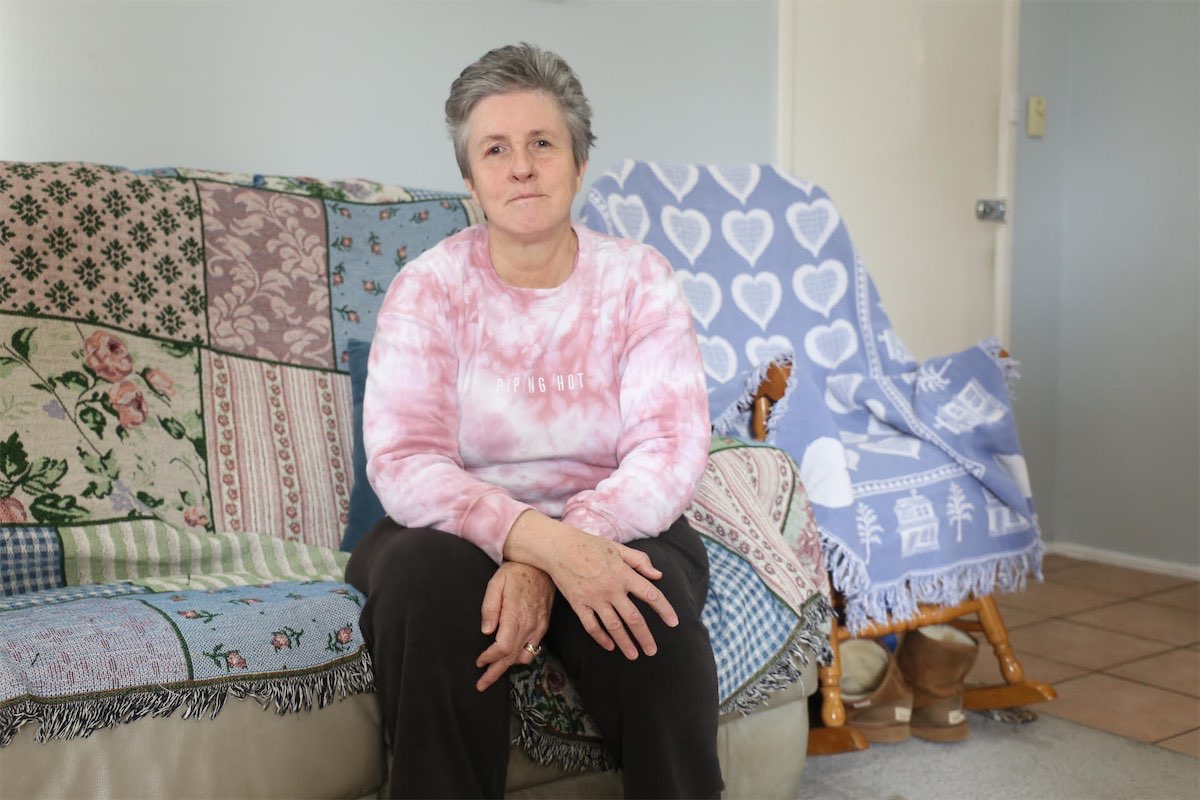
A LEGALLY blind grandmother being forced out of her home of almost 30 years, is the ACT government’s latest target for relocation under its unpopular social-housing scheme.
Gillian Uhle, 54, was already living in her Rivett home when she started losing her vision some 20 years ago.
Over the past two decades, the grandmother has become familiar with the layout of her home, and requires little assistance to find her way around having learnt where everything is.
“I know my way around,” Uhle said of the house she’s proudly called home for 28 years.
“Sure, I bump my head on a few cupboards every now and again, but I feel comfortable, confident and safe here.
“This is my home, I live a good life here.”
Uhle moves freely about her Marlock Street residence without the use of her cane, but risks losing the home she’s grown accustomed to under the ACT government’s Growing and Renewing Public Housing Program.
She is one of 340 Canberra tenants being relocated under the program designed to “grow the public housing portfolio and provide homes for more households in need” and deliver homes that are “modern and energy efficient to help improve the quality of life for tenants”.
It has come as an enormous shock to Uhle, and her husband Brian, that someone with impaired vision should have to leave their long-held home, which is set to be sold-off.
“It has completely crushed us,” Uhle said.
“We’ve raised our three children here. I lost my vision in this house.
“We’ve got so many memories, not all of them pleasant, but it’s home and we don’t want to move.”
The home has not only been a source of stability for the couple, but also for their grandchildren.
“Our grandchildren stay overnight at least twice a week to give respite to their mum who has PTSD from family violence,” Uhle said.
“It’s a home for them, too, a place of safety, consistency and love.”
Earlier this year the couple received an unexpected notice from Housing ACT informing them they will be moved to a new public-housing property.
“The letter was unsigned so we wondered at first if it was a hoax,” said Uhle.
“We sat on the lounge, looked around the room and thought this may not be our home anymore. I felt exposed, and vulnerable, as if I was dangling in space.”
While the former early childhood teacher, who currently manages a local op shop, understands the reasoning behind the housing-relocation program and its intentions, she can’t help but ask the question “why me” given her situation.
“We feel as if we have been cherry picked,” Uhle said.
“This is a good area, and the sale of the house will make lots of money.
“But they [Housing ACT] asked us in writing two years ago if we wanted to move and we said no. Then they called us a year ago and asked us again and we said no, we’ve just had 23 downlights put in to improve the lighting because I’m legally blind.
“I don’t know why they would do it this way. There was never any hint this would ever be forced, up until now.”
ACT Council of Social Service CEO Emma Campbell, who has led the charge against the program, says the government is intent on implementing the program irrespective of the upheaval it’s causing to tenants like Uhle.
“I don’t think Gillian would have had any objection to being approached to discuss opportunities about a voluntary move, but it’s the mandatory nature of this and the fact that people like Gillian simply received letters telling them they had to move,” Campbell said.
“To me that’s the particularly callous nature of this process.”
While Campbell recognises the need for social housing renewals, she argues that the program’s implementation is having an adverse effect upon too many long-term social housing tenants.
“We are not against the program in principle, we just want to make sure it’s not done at the expense of some of our most vulnerable tenants.”
She has also criticised the narrow window of opportunity provided to the 10 social-housing tenants seeking an exemption under the scheme.
“They [Housing ACT] rang the tenants inviting them to appear in front of a panel which would be convened in less than 48-hours,” Campbell said.
“If you are a vulnerable person, or any person for that matter, you have to read and absorb the information, and you need to contact an advocate or a lawyer or family member for support. I can’t imagine any circumstance that 48 hours is an appropriate period of notice to give to someone.”
Despite the distress, the Uhles are determined to remain in their home.
“This is our home, and we look after it like it’s our own,” Uhle said.
“We don’t ask for much, we just want to stay.”
Who can be trusted?
In a world of spin and confusion, there’s never been a more important time to support independent journalism in Canberra.
If you trust our work online and want to enforce the power of independent voices, I invite you to make a small contribution.
Every dollar of support is invested back into our journalism to help keep citynews.com.au strong and free.
Thank you,
Ian Meikle, editor





Leave a Reply